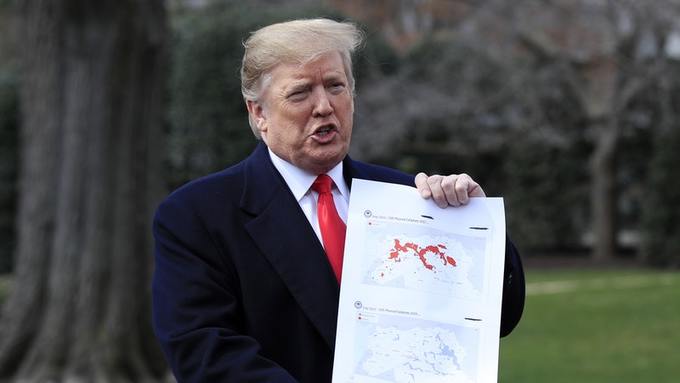
President Trump puffing out America’s chest in proclaiming ultimate victory against ISIS a few weeks back was met with skepticism from some in the American news media. In a piece in Politico, the announcement was denounced as “the hopeful story that hawks within the Trump administration are selling.”
Why did President Trump need to make such a bold declaration about this now? Is this a veiled attempt to conjure up positive press? Is the desire to achieve the “end” of America’s involvement in an unpopular war overshadowing the practicality of a full pull out when the regions under “residual ISIS influence” remains comparable to the square mileage formerly held by the radical group during its height?
Whatever the motivation for the President’s messaging, it is temporarily being celebrated as a victory for the non-neocon wing of the Trump base who have long advocated against costly intervention. But has the unpopular string of American wars that eventually birthed groups like the Taliban and ISIS really ended?
Pundits can argue what constituted the true tipping point for America among the most recent of this series of conflicts, but whether it was the invasion of Iraq, the Arab Spring or President Barack Obama’s fumbling of the region subsequent to President George W Bush’s aggressive Middle East policy, America has little to show for the trillions of dollars spent and thousands of American lives lost.
It can be argued that ISIS still possesses the money and the radicalized membership to still operate as the loosely constructed renegade group they rose as. With generational perpetuation of low cost attacks against non military targets, it can also be assumed that the 1400-year record of Middle Eastern skirmishes, invasions in the name of Allah and brutal societal values foreshadow the future as the United States looks to finally cut this cord significantly.
Since Trump is seemingly committing to reverse course into more of an isolationist strategy on the Middle East, how else will this affect the United States in relation to the region? Will Trump actually enforce the so-called “Muslim Ban” that liberals with little understanding of the continuing influx of needy foreigners into America constantly charge the president of sustaining? Will the United States still be compelled to continue to accept refugees while under pressure from the United Nations instead of offering humanitarian aid money?
The refugee experiment has largely been a failure in the European Union. In the UK, a report from the Spring of 2018 indicated that there was a surge in acid attacks committed, with over 2,000 cases under investigation during a 3 year period. The Heritage Foundation also compiled a report that stated, “Almost 1,000 people have been injured or killed in terrorist attacks featuring asylum seekers or refugees since 2014. Over the past four years, 16 percent of Islamist plots in Europe featured asylum seekers or refugees.”
In America, President Trump stated with the release of the “Executive Order Protecting The Nation From Foreign Terrorist Entry Into The United States,” that, “The Attorney General has reported to me that more than 300 persons who entered the United States as refugees are currently the subjects of counterterrorism investigations by the Federal Bureau of Investigation.”
While this startling number was downplayed by the Washington Post, the fact is that organized and well-funded terror organizations do not require a large number of accomplices to plan and execute their deadly attacks. The September 11th, 2001 attacks against the United States that killed 2,996, only required 19 hijackers, while the November 2015 Paris attacks killed 137 people and was carried out by only 9 shooters.
As long as Islamic extremism continues to exist the residual effect on the rest of the world will include preparing for attacks that some, including London Mayor Sadiq Khan, have dismissed as just 'part and parcel' of living in a major city. Although there is no guarantee that America will continue on the isolationist path long-term, President Trump has at least temporarily shielded larger numbers of American troops from the horrors of perpetual Middle Eastern war.
Julio Rivera is a Business and Political Strategist, Columnist and Editorial Director of Reactionary Times.





Leave a Reply
Thank you for your response.
Please verify that you are not a robot.